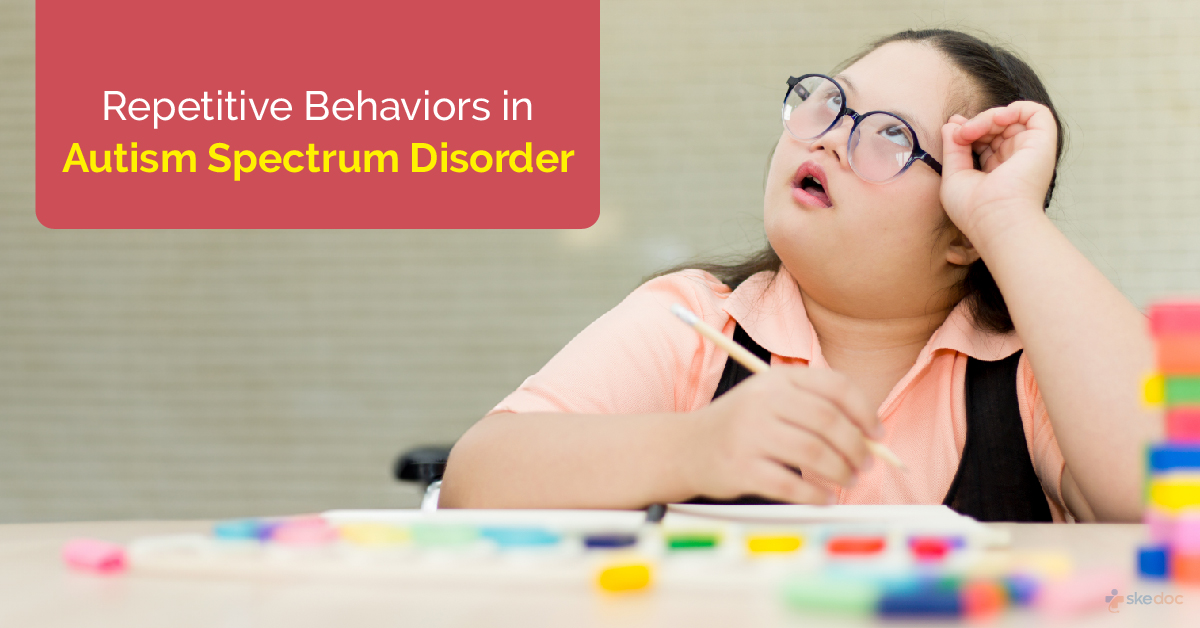Allergy
Blood Diseases
Bone & Joints
Brain
Cancer
Child Care
Cosmetic Surgery
Diabetes
Endocrinology
ENT
Eye
Gen Medicine
General Surgery
Heart
Kidney
Lifestyle
Liver & Digestive
Lung
Men’s Health
Mental health
Physiotherapy
Rheumatology
Skin and hair
Sleep Disorders
Spine
Transplant
Women Health
Thyroid
Vascular Surgery
Repetitive Behaviors In Autism Disorder

What is Autism?
Autism, currently referred to as autism spectrum disorder, is a group of conditions associated with improper brain development that results in altered social interaction, communication, and perception by the affected individual. The condition is present in early childhood and persists through adulthood, resulting in difficulties related to education, work, and normal functioning in society.
What are the causes of autism?
Medical experts are of the opinion that there is probably more than one cause of autism that can result in the condition, and these include genetic factors, including genetic disorders, and environmental factors, such as viral infections, exposure to air pollutants, medications, and complications during pregnancy.
What are considered as the 3 core symptoms of autism?
While autism can present with a myriad of symptoms and vary greatly between affected individuals, the three core characteristic features that are seen in autism include
- Impaired communication – which can include
- Delayed or absent speech
- Limited or absent nonverbal communication
- Problems with language development, unusual vocabulary
- Flat or un-modulated speech, inability to understand sarcasm, repetitive speech, etc.
- Impaired social or reciprocal social interactions – which can include
- Absence of response to the facial expression of others
- Little or complete lack of Imagination – the child does not pretend to play
- Absence of interest and purposefully avoiding playing with other kids
- Inability to express pleasure
- Inability to initiate any activity
- Aggressive or violent behaviours, lack of awareness of social norms
- Repetitive, restrictive, and stereotypical behaviours and patterns
What are repetitive behaviours seen in autism?
Repetitive Behaviours, Restrictive Behaviours, and Stereotypical Behaviours are jointly considered as one of the 3 core symptoms of autism spectrum disorders. These repetitive behaviours are purposeless, usually combined with highly rigid and selective interests. They can be broadly categorized as follows
- Repetitive Motor Movements or Lower Order Motor Movements – Can include rocking movements, spinning movements, hand flapping, head banging, lining up of toys, flipping objects, repetition of words or noises that others make (Echolalia), repetition of unusual words or phrases
- Inflexible Ritualized Patterns of Nonverbal or Verbal Behaviour – the individual is highly insistent on the same routine and gets highly distressed when there is even a small alteration. These can include the inability to adapt to changes, rigid thinking patterns, sticking to the same food, route of travel, greeting rituals, etc.
- Higher Order Repetitive behaviours and restricted and specific interests – strong connection with a particular object, subject, or hobby.
Repetitive behaviours may also be categorized as stereotypical behaviours and preservative behaviours. Stereotypical behaviours refer to the constant repetition of a movement or act, and preservative behaviours refer to the constant vocal repetition of words, phrases, or details.
What causes repetitive motor behaviours in individuals with autism spectrum disorders?
Medical experts believe that one of the causes of these repetitive behaviours is due to alterations at a genetic level. Motor reflexes that are essential for an individual's normal development come under voluntary control as the individual grows. Motor repetitive behaviours usually disappear by age 4-6 years in general. Still, in individuals with autism spectrum disorders, gene alterations cause the persistence of these motor reflexes from early childhood into adulthood without any voluntary control.
In individuals with autism spectrum disorders, repetitive behaviours may be seen constantly or may only be seen when the individual is stressed. Repetitive behaviours can help to calm an individual with autism when they are exposed to external stimuli, causing high sensory input. The repetitive behaviours help the individual block out the sensory input and divert their attention to something familiar, which helps them calm down and not react violently or aggressively.
Are autism repetitive behaviours harmful?
Not all repetitive behaviours are harmful; in some individuals, they may even serve a purpose. Repetitive behaviours such as head banging or biting can lead to self-harm and be considered harmful. But, most repetitive behaviours are harmless, and higher order repetitive behaviours may even benefit some, as they can help them find a purpose or get along with other individuals who share the same interests.
However, repetitive behaviours could distract or impede normal social interactions, as these behaviours would either interfere with normal activity or make other people uncomfortable when interacting with the individual. The effects of repetitive behaviours can include
- Difficulties with daily activities
- Negative effect on social interactions
- Negative effect on communication
What can address repetitive behaviours in individuals with autism spectrum disorders?
While there may not be a need to stop or address a repetitive behaviour in general, an intervention may be necessary if the repetitive behaviour is likely to cause self harm. Some measures that can help with the management of repetitive behaviours include
- Behavioural Therapy – Can help the individual overcome these actions
- Integration Therapy – Can help the individual gain self-control and reduce stress
- Higher Order behaviours can be channelled into rewarding activities that can help the individual in the long run
- Medications – This may be required to manage repetitive behaviours triggered by stress or anxiety.
When the signs or symptoms of autism are noticed in a child, it is advisable to seek a consultation with a psychiatrist nearby. Individuals with autism spectrum disorders can greatly benefit when the child receives early interventions to help them with their condition and when parents are advised and educated about what needs to be done to provide their child with a safe environment to grow and develop.
Was this article helpful?
YesNo




